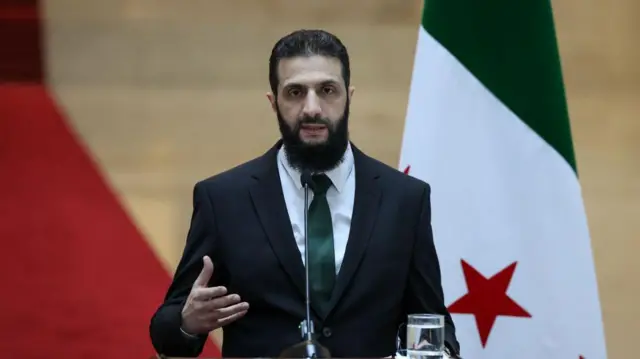Syria’s Transitional President Confirms Ongoing Talks with SDF Amid Foreign Pressure
By Kardo Roj
DAMASCUS, Syria (North Press) – Syria’s transitional president, Ahmed al-Shara, confirmed on Monday that negotiations with the Syrian Democratic Forces (SDF) are ongoing, but claimed that certain foreign powers are working to derail the process.
“There are negotiations with the SDF to resolve the status of northeastern Syria, but I prefer not to disclose details because some countries do not want these talks to succeed,” al-Shara said in an interview with Syrian television.
Progress and Challenges in Negotiations
Since the fall of former president Bashar al-Assad’s regime, diplomatic channels between Damascus and the SDF have remained open, aiming to reach a settlement acceptable to all Syrian factions.
Al-Shara indicated that the SDF has shown willingness to integrate under state control but noted that some points of contention remain. “The SDF is open to limiting arms to state authorities, but there are some partial differences in approach,” he explained.
The transitional leader emphasized that his administration is committed to rebuilding Syria’s governance framework and stabilizing the country. “Our external diplomatic efforts are solely for the benefit of the Syrian people and to restore Syria’s regional standing,” he said.
Future Political and Security Framework
Al-Shara reiterated that Syria’s immediate priority is national security, including controlling weapons and ensuring stability. “Our country has reached a safe harbor, and the Syrian state is a guarantor for all sects. Our priority now is to regulate arms and place them under state control,” he stated.
Looking ahead, he outlined plans for an interim parliament and gradual political reforms. “In the coming phase, there will be greater freedoms within a legal framework. A temporary parliament will be established, and presidential elections require proper infrastructure,” al-Shara said, suggesting that the transitional government is laying the groundwork for a long-term political solution.
He also stressed that competence, rather than sectarian or political affiliations, would be the key criterion in government appointments. “I am working to prevent sectarian power-sharing in government positions. Merit and expertise should be the foundation of governance,” he added.
Regional and International Reactions
Al-Shara’s remarks come amid heightened regional interest in Syria’s future, with neighboring countries and international powers closely monitoring developments. The SDF, which controls large areas in northeastern Syria, has yet to publicly comment on the president’s latest statements.
Some analysts argue that international actors, including Turkey and Iran, might have a vested interest in obstructing these negotiations. Both countries have maintained a strong military presence in Syria and have their own strategic objectives that could be at odds with a unified Syrian state under a single government.
Despite these challenges, al-Shara appeared optimistic about Syria’s path forward. “We are in a stage of rebuilding the rule of law in the country. Syria must remain a sovereign nation, free from external interference,” he emphasized.
What’s Next?
While the details of the ongoing negotiations remain undisclosed, al-Shara’s statements indicate that dialogue between the Syrian government and the SDF is progressing, albeit with significant obstacles.
Observers suggest that any potential agreement would likely include provisions for the integration of SDF forces into Syria’s national military, as well as guarantees for the political and administrative rights of Kurdish and other ethnic communities in northeastern Syria.
As Syria continues its transition after more than a decade of conflict, the success or failure of these talks will play a crucial role in shaping the country’s political landscape.

